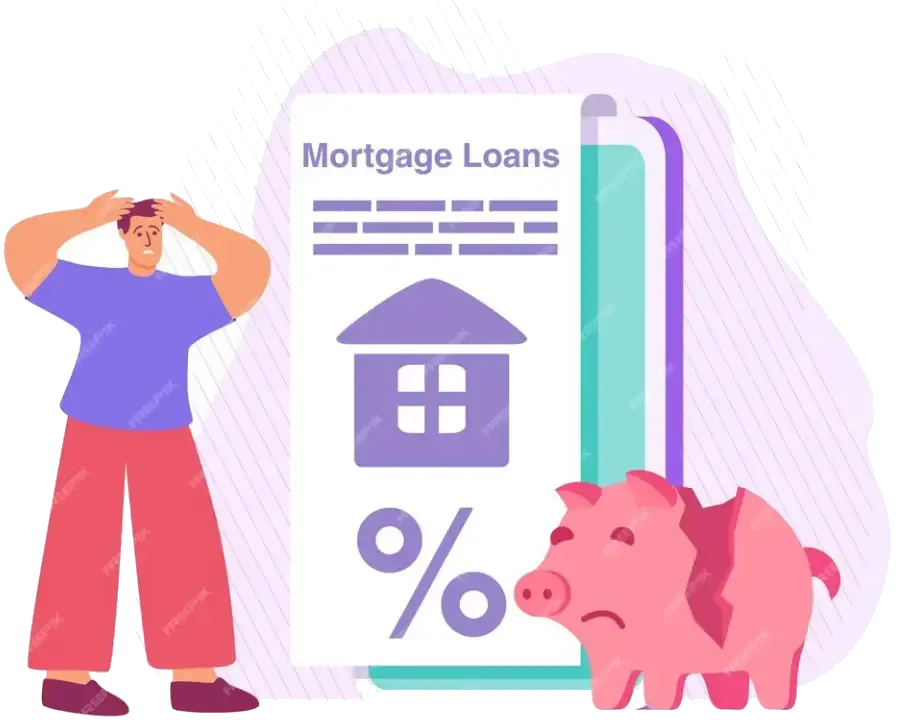
Mortgage Mistakes to Avoid
Getting a mortgage is a critical step on the path to homeownership, but the process can be filled with pitfalls.
Avoiding common mistakes can make the difference between a smooth experience and an unnecessarily stressful one. Here are some of the top mortgage mistakes that homebuyers often make—and how to avoid them.


1.Neglecting to Check Your Credit Score Early
Your credit score is one of the most important factors influencing your mortgage options and interest rate. Failing to review your credit report early in the process can leave you unprepared for issues that could delay your mortgage approval or lead to higher rates..
Avoid This Mistake by:
Checking your credit score well in advance—ideally six months to a year before applying.
Reviewing your report for any inaccuracies or potential areas for improvement, like high credit utilization or unpaid accounts.
Avoiding new debt or credit accounts during the mortgage application period, as these can affect your debt-to-income ratio.

2. Ignoring Closing Costs
Another common mistake is ignoring closing costs. Many first-time homebuyers are unaware of the various fees associated with closing a mortgage, such as attorney fees, title search fees, and appraisal fees. These costs can add up quickly and significantly impact the total cost of the mortgage.
To avoid this mistake, research the average closing costs in your area and budget accordingly. Be sure to factor in these costs when considering the overall cost of the home.

2.Overlooking All Associated Costs of Homeownership
Many buyers focus solely on the down payment but overlook other upfront costs like closing costs, property taxes, homeowners insurance, and ongoing maintenance expenses. Underestimating these costs can leave you financially stretched once you’ve purchased the home.
Avoid This Mistake by:
Creating a budget that accounts for all the costs, including an emergency fund for unexpected expenses.
Working with your lender to get a clear breakdown of closing costs and any additional fees.
Factoring in property taxes, HOA fees, and estimated maintenance costs into your monthly budget.


3.Skipping Mortgage Pre-Approval
Shopping for a home without a pre-approval is risky, as you may fall in love with a home outside your budget or miss out on competitive offers. Pre-approval gives you a realistic view of what you can afford and makes your offer stronger in a competitive market.
Avoid This Mistake by:
Starting with a mortgage pre-approval to understand your price range and monthly payment expectations.
Making sure your pre-approval is up-to-date, especially if your financial situation changes.
Consulting with your lender if your financial picture changes during the buying process, as this can impact your approval status

4.Changing Jobs or Making Large Purchases During the Loan Process
Your lender will verify your employment and financial status multiple times during the loan process. Any major financial shifts—like changing jobs, buying a new car, or taking on new debt—can disrupt or even disqualify you from securing your mortgage.
Avoid This Mistake by:
Avoiding any major financial moves until after your mortgage has closed.
Consulting with your lender if you must make a significant change, like a job switch, to understand the potential impact on your approval.
Keeping your spending stable and holding off on large purchases, as these can affect your debt-to-income ratio.

4. Taking on Too Much Debt
Taking on too much debt before or during the mortgage process can have serious consequences. Lenders look at your debt-to-income ratio when determining your eligibility for a mortgage. If you have too much debt, you may not qualify for a mortgage or may be offered a higher interest rate.
To avoid this mistake, avoid taking on new debt before or during the mortgage process. This includes opening new credit cards, taking out a car loan, or making large purchases on existing credit cards.

5.Not Shopping Around for the Best Mortgage Rate
Choosing the wrong mortgage can be a costly mistake. There are various types of mortgages available, and each has its pros and cons. Choosing the wrong mortgage can lead to higher interest rates, higher monthly payments, and a more significant financial burden in the long run.
Avoid This Mistake by:
Requesting quotes from multiple lenders to compare interest rates, fees, and terms.
Considering different types of loans, like FHA, VA, or conventional mortgages, to find the best fit for your situation.
Working with a mortgage broker who can shop rates for you and may offer additional insights.
6.Choosing the Wrong Loan Type
Not all loans are created equal, and different loan types suit different financial situations. Buyers who don’t research the pros and cons of each type—like FHA vs. conventional or adjustable-rate vs. fixed-rate—may end up with a loan that doesn’t fit their needs or budget.
Avoid This Mistake by:
Discussing loan options with your lender or mortgage advisor to find the best choice for your financial goals.
Reviewing how each loan type impacts your down payment, interest rate, and long-term costs.
Asking about special programs, especially for first-time buyers, veterans, or those with certain income qualifications.


7.Underestimating the Importance of a Stable Debt-to-Income Ratio
Lenders assess your ability to repay the loan by examining your debt-to-income ratio (DTI), which compares your monthly debt payments to your income. A high DTI can disqualify you from some loan programs or result in less favorable terms.
Avoid This Mistake by:
Paying down as much debt as possible before applying for a mortgage to improve your DTI.
Avoiding new debts, like car loans or credit card balances, until after the mortgage process is complete.
Working with your lender to understand how your DTI affects your loan options and monthly payment obligations.
8.Overborrowing and Stretching Your Budget Too Thin
It’s easy to get caught up in the excitement of buying a home and agree to a mortgage that pushes your budget to the limit. While you may technically qualify for a higher amount, it doesn’t mean it’s the best decision for your financial health.
Avoid This Mistake by:
Setting a clear budget based on your income, expenses, and financial goals before house hunting.
Using a mortgage calculator to estimate monthly payments and determine what you’re truly comfortable with.
Thinking about long-term financial security, including retirement, emergency savings, and lifestyle expenses.

Final Thoughts
Avoiding these mortgage mistakes can help you secure a loan that aligns with your goals and sets you up for long-term success as a homeowner. By preparing in advance, understanding the costs, and carefully navigating the mortgage process, you’ll be better equipped for a smooth path to homeownership. Remember, working with a knowledgeable mortgage professional can make all the difference in guiding you through each step.
© Copyright 2023 Mortgage Made Easy. All rights reserved
.Mortgage Made Easy
. - |
.
Notice To Texas Loan Applicants: Consumers wishing to file a complaint against a mortgage banker, or a licensed mortgage banker residential mortgage loan originator, should complete and send a complaint form to the Texas Department of Savings and Mortgage Lending, 2601 North Lamar, Suite 201, Austin, TX 78705. Complaint forms and instructions may be obtained from the department’s website at www.sml.texas.gov
.
A toll-free consumer hotline is available at 1-877-276-5550. The department maintains a recovery fund to make payments of certain actual out of pocket damages sustained by borrowers caused by acts of licensed mortgage banker residential mortgage loan originators. A written application for reimbursement from the recovery fund must be filed with and investigated by the department prior to the payment of a claim. For more information about the recovery fund, please consult the department’s website at www.sml.texas.gov
